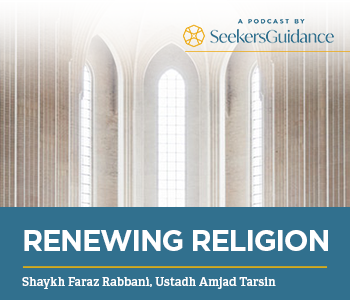22: Guarding Speech, Condemnation of Envy & Rancour – Renewing Religion: An Overview of Ghazali’s Ihya – Shaykh Walead Mosaad
Podcast: Play in new window | Download (26.5MB)
In this lesson, visiting scholar, Shaykh Walead Mosaad, reviews the chapters on holding one’s tongue and condemnation of rancour and envy. These chapters are originally written by Imam Ghazali in his book Ihya Ulum al-Din.
Shaykh Walead begins with the chapter on holding one’s tongue and the criteria for one should or should not speak. One should know that there speech is significant and has an effect. In addition, speech is not limited to what we say, but also what we propagate on social media. We have gotten into the habit of naming and shaming online in order to showcase that they’ve made a mistake. However, the sunnah of the Prophet was about having wisdom, and his speech was always measured. As such, we should follow his example and not what we have become used to in our cultures or current state of affairs.
The Quran and Sunnah give us very vivid descriptions of the punishments people are given for the sins of the tongue because of the gravity of those actions in the eyes of Allah. Imam Ghazali lists the sins of the tongue from the least worst to the worst:
[1] Talking about what doesn’t concern you.
[2] Talk that is trivial or repetition of something that isn’t important
[3] Talking about (or watching) sins even if one doesn’t partake in them
[4] Aimless disputation and arguing about things that may in and of themselves wrong to argue about
[5] Say something about someone that you feel has wronged you or taken your right but what you talk about is irrelevant to the situation
[6] Trying to talk very poetically to get people’s attention
[7] Using vulgar language
[8] Damning and cursing others (even animals)
[9] Singing songs with bad meanings
[10] Joking excessively
… there are 10 more mentioned in the chapter that were not covered in the lesson due to time constraints.
The second chapter, Shaykh Walead reviews relates to the condemnation of rancour and envy. The desires of the human are divided into two types: appetites and anger. These desires are there to support a person’s survival. For this reason, anger can be both justified and unjustified. Unjustified anger stems from entitlement and ego, when one isn’t recognized for that which they are deserving of that makes them angry. When that is left to fester it develops into enmity and envy. The cure to it is a combination of knowledge and practice. Knowing that this is wrong and harms you more than the other person. In addition, practicing patience and suppressing anger; there is great reward in that.
Lastly, remember that anger and envy stem from an objection to Allah’s decree and Allah’s giving to you and to them.
In this brief overview of Imam Ghazali’s opus magnum, Ihya Ulum al-Din (Renewing the Religious Sciences), this series will serve as blueprint for how the believer can bring to life their religion. It will aim to help the believer to not just practice the form of the religion properly, but to also practice it with excellence.
Join our Ramadan 2017 program: #RamadanRenewal, in-person at SeekersGuidance Toronto or online through the SeekersGuidance Global platform. For more details, visit: http://seekershub.org/ramadan2017.
